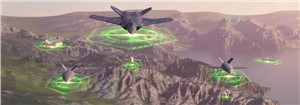Indra Signs an Agreement with Spanish Startup IDBOTIC, Now onboard NGWS/FCAS
July 19, 2024
-Indra has closed a deal to add the Spanish startup IDBOTIC into the NGWS/FCAS program, Europe's largest and most ambitious defence program that is addressing the development of the future air combat system, key for the continent to maintain its air superiority throughout the 21st century.
This startup, which was created in 2019, specializes in hardware encryption and authentication of the Internet of Things (IoT) communications in the defence, industry and telecommunications sectors.
With the signing of this agreement, it joins forces with Indra for the development of disruptive technologies that facilitate a non-clonable identity for the different sensors and systems that will make up the Next Generation Weapons System/Future Combat Air Warfare System (NGWS/FCAS).
This is a critical system to ensure the security of our continent in the future and will be based on a sixth-generation fighter that will fly escorted by several remotely piloted aircraft, called carriers, all operating within a combat cloud. The cloud introduces a completely revolutionary element in air combat, facilitating real-time data exchange between different platforms - air, naval, ground - by dynamically creating a sophisticated network of sensors and effectors distributed throughout the theater of operations, providing unprecedented situational awareness and the possibility of coordinating the actions of all these platforms as if they were a single entity.
The development of such 'systems of systems', with the capability of simultaneous interventions in multiple defence domains, represents an enormous technological challenge, requiring the development of a completely new defence concept where communications security and resilience must be placed at the center of the architecture.
Among the multiple technologies that will be developed for this purpose, Indra and IDBOTIC will tackle three parallel projects that provide security at different levels: the first is focused on guaranteeing hardware security (Non-Clonable Physical Function); the second on the rapid distribution of private keys (Distributed Registration Technology); and the third on the integration of encryption and decryption processes, which will already be resistant to post-quantum attacks (Fully Homomorphic Encryption) that will come with the emergence of this new form of computing.
The FCAS Operations Director at Indra, Miguel García Moreno, assures that "with this agreement we take a step forward in our commitment to incorporating any company, SME, startup, research center or university now working on cutting-edge technologies into the NGWS/FCAS program. We need all of them to be part of this great technological program that will extend beyond 2040. We are confident that IDBOTIC's level of expertise and exceptional knowledge in the field of cryptography and secure communications will help us achieve better results faster, and also contribute to strengthening European technological sovereignty."
IDBOTIC's president, César Goyache, states that "our joining the NGWS/FCAS program allows us to make strides in our development of a dual technology that will find an enormous range of applications. We are proud to be collaborating with a great Spanish technology company such as Indra, which has opened its doors and facilitated our entry into what is undoubtedly one of the most exciting technology programs underway in Europe today."
IDBOTIC is a company that had already started working with Indra on sustainability 4.0 projects, helping to secure, for example, the network used by Indra's virtual assistant; a system that, through mixed-reality glasses, allows personnel in charge of maintaining equipment and platforms to connect remotely with other experts for support. IDBOTIC will now also work on the NGWS/FCAS program, an initiative that, in the words of the FCAS Operations Director, Miguel García Moreno, "will make Spain one of the most innovative countries in the world and will serve as a lever to structure the entire defence technology industry countrywide."
Source : Indra

